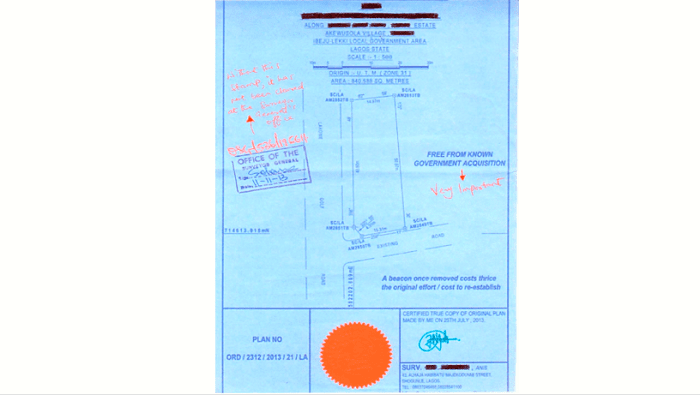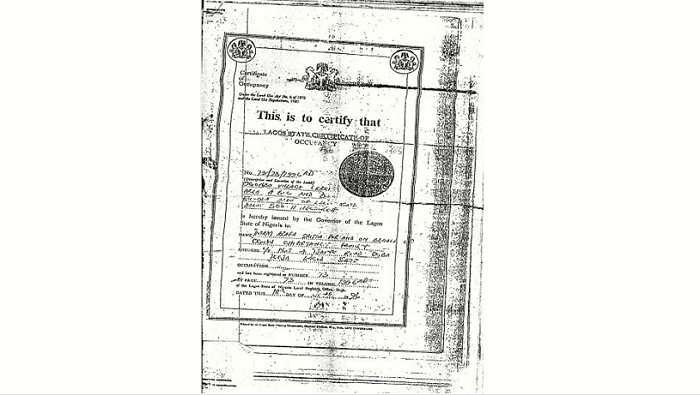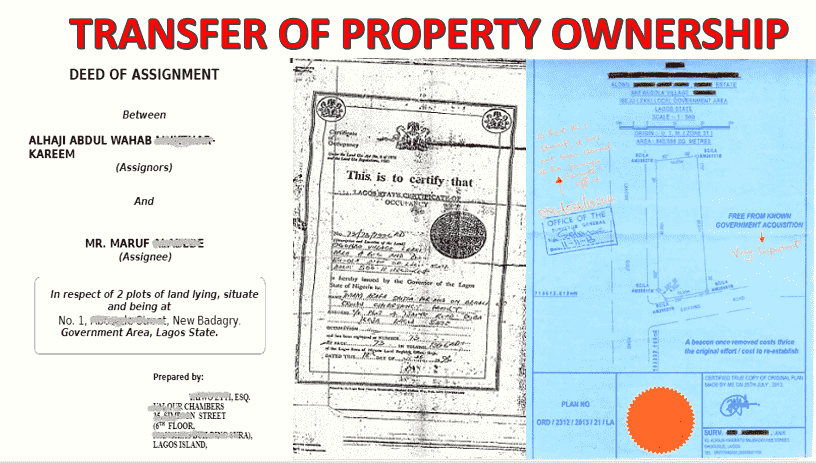Whether you’re buying, selling, or inheriting property in Nigeria, understanding the legal procedures for transferring property ownership is important to ensure a smooth and legal transaction. This article provides an in-depth guide to transfer of property ownership in Nigeria, with insights into the legal framework, detailed steps, and important considerations.
Understanding Land Ownership Transfer in Nigeria
The transfer of land/property ownership in Nigeria involves the transfer of legal rights to land /property from one individual to another. The transfer of property is governed by several laws, particularly in Lagos State. These laws include: the Land Use Act of 1978, the Administration of Estate Law of Lagos State 2015, the Land Registration Law of Lagos State 2015, and the Stamp Duties Law of Lagos State 2015.
There are various means by which property can be transferred in Nigeria. The main methods are sale, gift, and assent.
Sale
The sale of land involves the outright transfer of property from one party to another. A valid sale involves fulfilling specific conditions, such as obtaining approval from family members and community leaders for family or community-owned land.
- Town planning laws and regulations must also be considered to ensure compliance with government guidelines for building types that can be constructed in the area.
- Properties under litigation are not legitimately transferable.
- When land or a property has been sold, the required document transferring the title of the land and contract of sale specifying some terms of the transactions must be drafted and signed by both the buyer and seller.
- When dealing with the sale of land, it’s important to consider various factors that can impact the process. The history of ownership, encumbrances, outstanding debts, and potential government acquisition of the land are all very important elements to investigate before proceeding with the sale.
Gift of Property
Gift of property is also another method of transfer of property ownership in Nigeria. Unlike sales, gifts do not require registration fees. Instead, it requires the intention of the donor to gift the property, delivery to the recipient, and acceptance by the beneficiary. When an individual gets a property gift, he or she must make sure there is a valid proof stating that the land or property was gifted to him or her. Documenting this process involves creating a Deed of Gift, which can be registered with a land bureau.
Probate
Probate is the transfer of assets from a deceased person to beneficiaries through a valid will or other legal means.
- When an individual dies with a valid will, executors listed in the will can seek probate to become legal owners of the deceased’s assets.
- In cases where the deceased has no will, the property of the deceased will be distributed according to the relevant provisions of the law. The representatives of the deceased can apply as administrators of the estate, which makes them legal owners.
Property transfer documents in Nigeria
Several documents play a vital role in the transfer of property ownership in Nigeria. They include:
Land Purchase Receipt: a purchase reciept is typically issued in every financial transaction and property transactions are no exception. Upon sale of the land or property, the receipt is issued which acknowledges the transaction.
Contract of Sale of Land: This document sets the terms before finalizing a transaction, before the deed of assignment is prepared.It is relevant when any property is to be purchased by anyone.

Survey Plan: the survey plan illustrates the size of land of the property, with detailed description and coordinates. It also helps to know if the property is under government acquisition.

Certificate of Occupancy (C of O): This document is usually issued by the state government, indicating that a person now owns a parcel of land. C of O is issued to anyone in possession of a piece of land before 1979. State governments also give it to allottees of government land. An Individual who acquires land through a sale does not require a new certificate of occupancy, instead, a deed of assignment with Governor’s consent.
Deed of Mortgage: Used in mortgage transactions to temporarily transfer property from borrower(Mortgagor) to lender(mortgagee).The transfer in this case is temporary, meaning the mortgagor has the right to reclaim ownership from the lender once the loan amount has been fully repaid, along with the accumulated interest.
Deed of Gift: This document proves that property has been gifted from one individual (donor) to another (donee). It can also be used to transfer interest in a landed property.
Probate / Letter of Administration: Probate and letter of administration are both documents used to establish ownership after a person’s demise. A grant of probate is issued when an individual with a will dies while a letter of administration is issued when an idividual dies intestate (without a will ).
Assent: Legal document transferring an estate’s interest to beneficiaries or third-party buyers by the executors or administrators of an estate.
Judgment of Court: This document serves as a significant document in Nigeria for transferring property ownership between parties. This transfer often happens as a result of court rulings on legal matters or disputes related to the property.
Step-by-Step Property Ownership Transfer Process
- Investigation and Search: Conduct a thorough title search to verify property authenticity, uncover any encumbrances, and confirm ownership history.
- Prepare and Execute a Deed of Assignment: Draft the Deed of Assignment (prepared by a qualified legal practitioner) with precise property details, terms, and conditions. It should be signed by both parties (assignor and assignee) in the presence of witnesses.
- Obtain Governor’s Consent: Secure approval from the Governor or relevant authority as mandated by the Land Use Act. This involves submitting the application, documents, and fees for review and approval.
- Payment of Fees and Stamping: Pay statutory fees and stamp the Deed of Assignment within 30 days to comply with the Stamp Duties Act.
- Register the Transfer: After acquiring the Governor’s consent, the assignee must officially register the transfer at the appropriate land registry within a span of 60 days from the date of executing the Deed of Assignment, as stipulated by the Land Registration Law. This procedure entails submitting the executed Deed of Assignment, along with the Governor’s consent and other supporting documents to the land registry for formal registration.This registration not only serves as proof of ownership but also safeguards the legal rights of the assignee.

